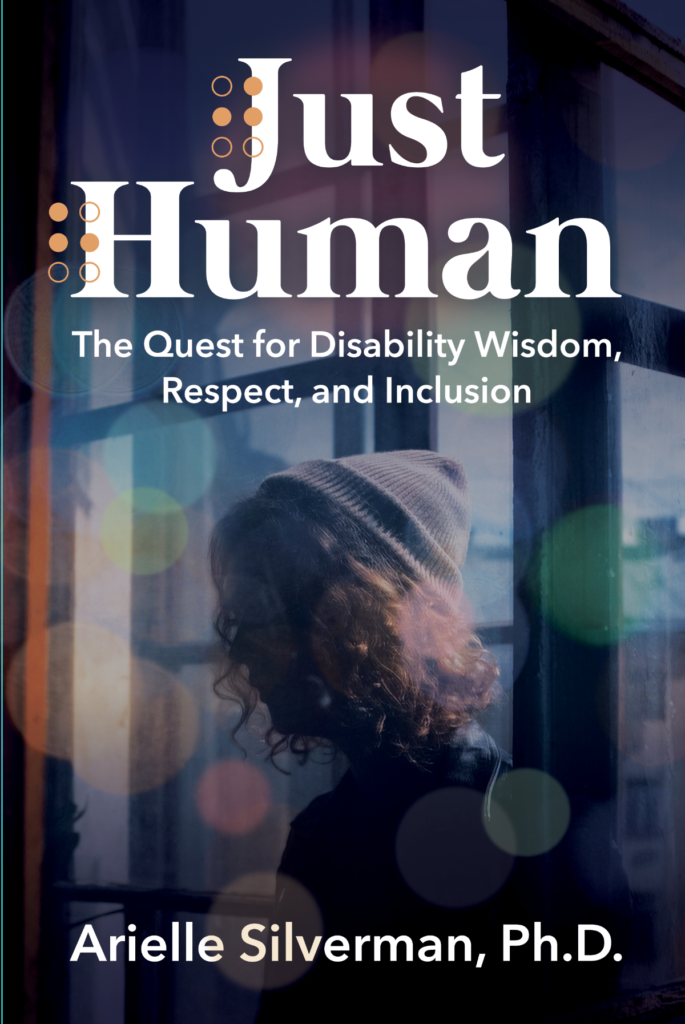I know, it’s been a while since you’ve seen an update on this blog, and not for any particular reason. I’ve had some professional twists and turns this year. In April I became the director of research at the American Foundation for the Blind
Which has come with many competing responsibilities. After some consideration, though, I’ve decided to reactivate the blog. I appreciate those of you who have subscribed, and I know you are looking to learn from the lived experiences of disabled people. The posts in the coming weeks will be a combination of guest posts from disabled bloggers on a variety of topics, updates on our research work at AFB, and updates related to my new book, Just Human: The Quest for Disability Wisdom, Respect, and Inclusion.
Speaking of said book, I appreciate all those who bought one or more copies during its first almost-nine months on the market, bringing it to a sales total of 567 copies so far! I am also very appreciative of the 44 individuals who rated the book on Amazon and gave it an average rating of 4.98! (I guess the readers who didn’t like it decided not to rate it…) I’ve shared a few reviews below. Interested? Check it out on Amazon! Or learn how to get an accessible copy here!
“This was a remarkable book. The author, blind since birth, a phD social psychologist, describes what she learned growing up combined with what she’s learned as a scholar and researcher. From her vivid descriptions of bullying in middle school, to finding love, to learning to get on in the world, to attaining her dream job, the book draws you in . Her insights apply not just to how people with visual impairment are regarded by the able bodied population but also to those with other disabilities and indeed those who for whatever reason ( skin color, ethnicity, gender, etc) may be subject to bias and discrimination. She asks that people regard her not with pity for her impairment and not place her on a pedestal ( as a source of inspiration) but regard her as ‘just human’ and relate to her by listening and withholding judgement . For someone so young ( 36), her wisdom is remarkable. The book is well written and very readable. She makes very difficult concepts fully understandable, and she communicates her passions, successes and her frustrations very effectively. As a pediatrician who has worked with kids with all sorts of disabilities, I think it will aid parents and clinicians in adopting more helpful approaches to use . Her insights about bias and discrimination and “deescalation ” in the broader society are also worthy of pondering .”
““JUST HUMAN” by Arielle Silverman, PhD is a wonderful mix of autobiographical content and expert social scientific analysis. The story begins as her Jewish American parents realize that she was born blind. She shares her recollections of learning at home, in the public school, at her local summer camp for blind children, at an adult training center for the blind, and at the university. I found myself smiling broadly at her successes and silently egging her on when she fell short. In testament to her skill as a storyteller, I related easily and fully to her adventures and misadventures whether in the classroom, the kitchen or the street (literally-see chapter 12).
Her writing style is easy and pleasant to read, straight to the point, honest and gentle on the reader’s conscience. She is not interested in adding to anyone’s guilt, but rather in challenging people with and without disabilities to relinquish long-standing, erroneous assumptions about each other. Readers begin to understand the abilities of a blind person to function fully and capably in their communities when given the chance and the needed accommodations.
Her writing is broad based and timely as she points out the lessons her stories teach for inclusion more generally, whether across lines of race, power, intellect, wealth, or health. Dr. Silverman has clearly set her heart and great intelligence to work helping people with a variety of strengths and difficulties to live, work and respect each other in personal and professional venues. Today, she works as a research specialist at the American Foundation for the Blind, co-coordinates a mentoring program for blind youth, and offers trainings in a philosophy she calls “disability wisdom.”
This book should be mandatory reading for anyone working in, or training students in, the fields of education, business, medicine, architecture, or law. In fact, it is a wonderful read for any parent raising children today.”
“I subscribe to Dr. Silverman’s Disability Wisdom blog, which is terrific, so I was excited to read her book, and she does not disappoint. The way the book is written – in such an accessible, relatable and engaging tone, makes it one I looked forward to reading at the end of the day, as a treat after work. Her suggestions are valuable for all readers, because her wisdom applies to humans regardless of their abilities. One passage stays with me, as Dr. Silverman describes one of many times she was ‘helped’ without asking or giving consent and was left the worse for it…this stays with me as a sharp illustration to us in how we presume to know another’s situation, and often act ‘on their behalf’ or ‘advise’ without ever finding out or educating ourselves on what’s needed. There is no finger pointing in this book, just wonderful relatable stories, and solid easy to follow insights. Well done.”

